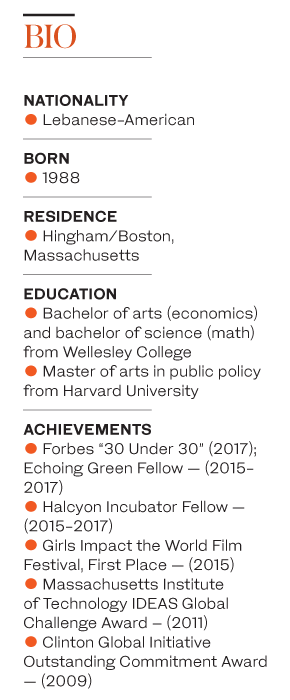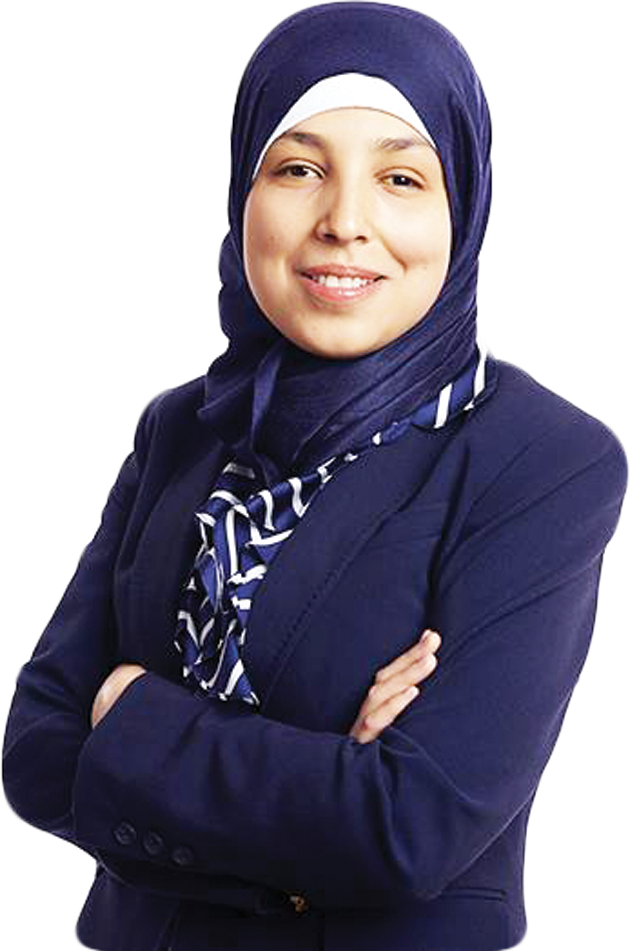CAMBRIDGE, Massachusetts: “I like to push boundaries,” Sara Minkara told me in the offices of her non-profit, Empowerment Through Integration (ETI), right across the street from Harvard’s Kennedy School of Government. From here, she works to make the visually impaired and disabled feel included in society.
“I’ve hiked and sled down a volcano in Nicaragua and biked through the jungle in Bali,” she added.
Now, all this sounds like a standard travel itinerary for daredevilish adventure groups, but not in this case. 
Minkara, a Muslim Lebanese-American, lost her sight at the age of 7 due to macular degeneration. However, she doesn’t let that stop her from doing what she loves to do.
“My mom never allowed us to stay home and say ‘I cannot do this because I can’t see’ … Never, we were never allowed to say that,” she said, referring to herself and her older sister, who is also blind.
Minkara hopes that ETI can help others to break the social constructs that limit people with disabilities and can give them the confidence to realize their full potential.
“I think the biggest obstacle that surrounds our disabilities is the social construct around us,” Minkara said.
She continued: “When you eliminate that stigma, to be honest, then dealing with your disability itself is not that big a thing. Realizing that these youth have been ingrained with this mindset that there’s something wrong with you — and believing there really is something wrong with you — is really harmful and it prevents you from tapping into your potential.”
Established in 2011 when Minkara was just a sophomore in college, ETI — through a grant from the Clinton Foundation — organized a summer camp in Tripoli, in northern Lebanon, that sought to empower young people with and without disabilities. The camp was such a hit among families and children that Minkara knew this couldn’t be the end of it.
“That camp was so empowering for the youth with and without disabilities, both for the families and the community. I realized that there’s more to this than just that one summer camp,” she said.
“I realized this is my passion, for me from a moral spectral lens, I think God gives us riziq (good fortune) and wealth in different ways, and I know that he gave me the wealth of support and empowerment. I felt it was my duty to share that wealth and that’s why I started ETI to be able to bring that empowerment to other kids with disabilities,” she said. “I never thought in a million years that I would be starting a non-profit — my strength is math, and I’m an introvert and graduated with a math and economics undergrad.”

Sara Minkara
Minkara was close to opting to do a PhD rather than expanding her organization. However, her thesis adviser pushed her to pursue her passion.
“He was, like, ‘Sara, why in the world are you applying to these PhD programs? Go pursue your passion. Your eyes sparkle when you talk about this camp. Go do that’,” Minkara said.
“If he hadn’t pushed me and encouraged me, I probably wouldn’t have started it,” she said. “It’s a risky thing.”
One of the workshops that Minkara runs through ETI is the In the Dark experience. Participants are blindfolded before entering the room and are told that they cannot say their names, nationalities, jobs and educational backgrounds, which are the four things “that we attach our value to,” Minkara said.
“So, they go in, they don’t know who they’re sitting next to, they cannot see each other, they don’t know anything. For two hours, without mentioning these four things, we guide them through an experience of getting to know themselves much more in each other and the connection, the bond, the trust they build is beautiful.
“If you meet a person for the first time without seeing them, the majority — 85 percent — of the labels cannot be formed, which means the majority of these assumptions cannot be created. So you’re really forced to get to know that person for who they are and listen to them for who they are.”
Minkara explained that the workshop allows participants to reflect on the way they usually meet people through socially constructed norms and “isms,” which goes back the non-profit’s mission to disrupt judgmental narratives.
The In the Dark experience can be tailored to suit the event based on the audience or setting, be it an office team-building workshop or an after-school program.
Other programs offered by ETI include Life Skills, which train blind and visually impaired youth to use key tools and techniques to navigate the world; Parent and Family Workshops which support families and friends of Life Skills participants; and Social Project Programs, which enable blind and sighted youth to work side-by-side on community service projects.
ETI’s human-centric approach places participants at the center of the workshops, where the program’s framework equips and trains them with tools that allow them to create effective solutions and empower them.
The non-profit operates in regions in where youth with disabilities, including refugees, are marginalized due to social stigma. It offers these groups the chance to build the competence and confidence needed to prosper and grow within their communities and act as agents of change.
“Our overarching mission is disrupting the narrative surrounding disability, moving from a charity-based perspective to a value-based perspective that’s not human rights-value based. Because right now people say, ‘Oh now I guess I have to educate,’ ‘I have to employ,’ ‘I have to integrate,’ ” she said. “We want to get to a point where (they say) ‘I want to’, ‘I see the value of integrating people with disabilities,’ and that narrative needs to be addressed to society at large, communities, families and individuals with disabilities.”























